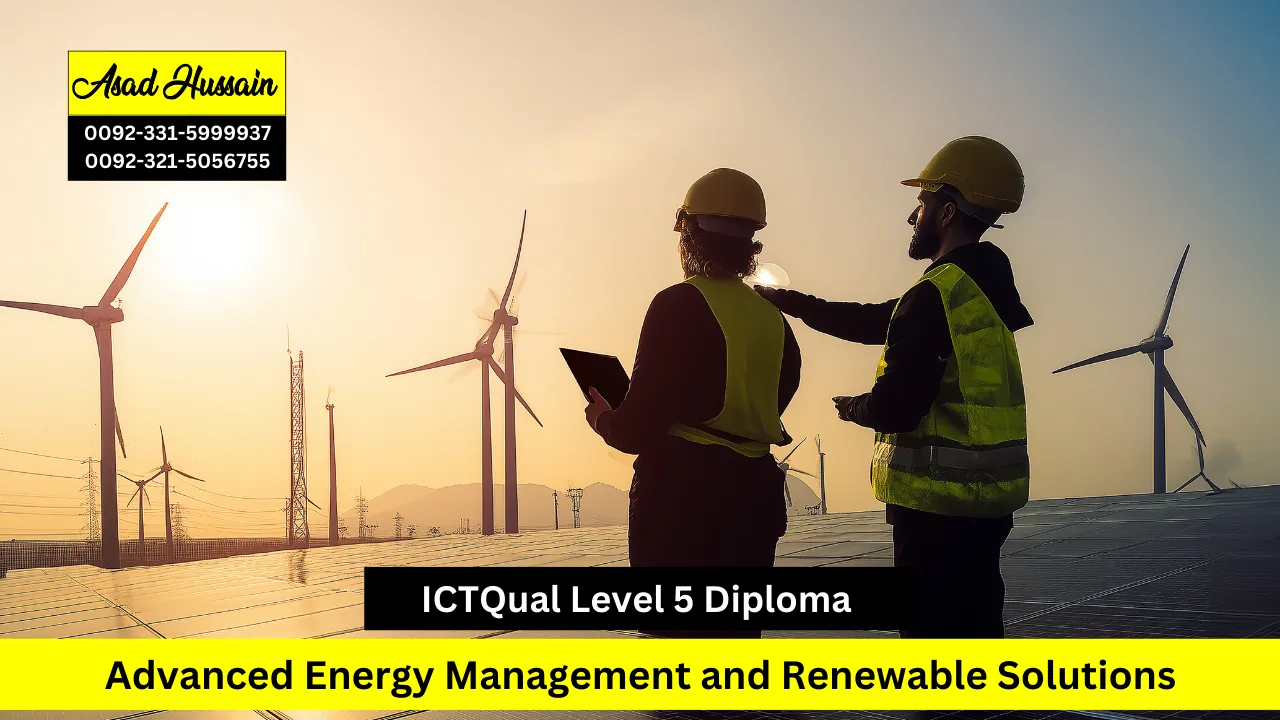In today’s rapidly evolving global landscape, energy management and renewable solutions play a pivotal role in driving sustainability, reducing carbon footprints, and ensuring efficient resource utilization. The ICTQual Level 5 Diploma in Advanced Energy Management and Renewable Solutions has been carefully designed to meet the growing demand for highly skilled professionals capable of addressing complex energy challenges in industries, businesses, and public sectors worldwide.
ICTQual Level 5 Diploma in Advanced Energy Management and Renewable Solutions provides a comprehensive understanding of renewable energy technologies, sustainable energy systems, energy auditing, policy frameworks, and efficiency strategies. Learners will gain the knowledge and practical skills to design, evaluate, and implement innovative energy management solutions that align with international standards and environmental goals.
By blending theoretical foundations with real-world applications, the course prepares learners to analyze energy consumption patterns, apply renewable integration techniques, and develop strategic approaches to energy conservation and sustainability. Emphasis is placed on equipping learners with critical problem-solving, project management, and decision-making abilities essential for modern energy professionals.
Graduates of this diploma will be well-positioned to take on advanced roles such as Energy Manager, Sustainability Consultant, Renewable Energy Specialist, or Environmental Policy Advisor across a variety of sectors including construction, manufacturing, utilities, and government organizations. With its strong focus on practical applications and industry relevance, this program serves as a gateway for professionals seeking to make impactful contributions toward a sustainable energy future.
Program Highlights
Study Units
- Strategic Energy Management Across Industries
- Renewable Energy System Integration
- Regulatory Frameworks and Compliance
- Advanced Sustainability Solutions
- Industry-Specific Energy Solutions
- Financial and Project Management for Energy Projects
- Emerging Technologies and Innovations
- Global Case Studies and Best Practices
- Practical Workshops and Simulations
- Capstone Project
To enroll in the ICTQual Level 5 Diploma in Advanced Energy Management and Renewable Solutions, learners must meet specific academic, professional, and language criteria. These requirements ensure that participants are well-prepared to succeed in this advanced program and contribute effectively to the energy and sustainability sector.
Age Requirements
- Learners must be at least 18 years old at the time of application.
- Mature learners aged 21 and above with relevant professional experience are encouraged to apply.
- No upper age limit, making this program suitable for professionals at different career stages.
Educational Requirements
- A Level 4 Diploma or equivalent qualification in energy management, engineering, or a related discipline.
- Candidates with backgrounds in mechanical, electrical, or environmental engineering are preferred.
Professional Experience
- Ideally, 1–2 years of experience in the energy, engineering, sustainability, or environmental sector.
- Practical involvement in renewable energy projects, facility management, or energy efficiency initiatives is an advantage.
- Candidates with leadership or supervisory experience in energy or sustainability roles are highly regarded.
English Language Proficiency
- For non-native English speakers, proof of language proficiency is required (e.g., IELTS 5.5 or equivalent).
- Previous study in English-medium institutions may also be considered.
- Applicants must demonstrate good written and verbal communication skills in English.
The ICTQual Level 5 Diploma in Advanced Energy Management and Renewable Solutions is designed to provide learners with advanced knowledge, practical expertise, and strategic insights into modern energy management practices. By the end of the program, graduates will be able to demonstrate applied competencies across technical, managerial, and sustainability-focused areas, enabling them to play key roles in the global transition to renewable and efficient energy systems.
Strategic Energy Management Across Industries
- Apply advanced principles of energy management in industrial, commercial, and residential sectors.
- Develop strategic energy efficiency plans tailored to diverse operational environments.
- Evaluate the impact of energy consumption patterns on organizational performance and sustainability.
Renewable Energy System Integration
- Design and assess renewable energy systems such as solar, wind, biomass, and hydropower.
- Integrate renewable solutions with existing grid systems and hybrid technologies.
- Conduct feasibility studies and technical evaluations for renewable installations.
Regulatory Frameworks and Compliance
- Interpret and apply international, regional, and local energy regulations.
- Ensure compliance with environmental and safety standards in energy projects.
- Develop policies and procedures that align with regulatory frameworks.
Advanced Sustainability Solutions
- Implement advanced strategies for reducing carbon footprints and optimizing energy use.
- Promote sustainable energy practices within organizations and communities.
- Evaluate sustainability indicators to measure project success.
Industry-Specific Energy Solutions
- Analyze sector-specific energy challenges in industries such as oil and gas, construction, and manufacturing.
- Recommend tailored solutions for improving energy efficiency in critical sectors.
- Apply industry benchmarking and best practices to optimize energy performance.
Financial and Project Management for Energy Projects
- Prepare financial models and cost-benefit analyses for energy projects.
- Apply project management methodologies to renewable and energy efficiency initiatives.
- Manage budgets, timelines, and resources for large-scale energy projects.
Emerging Technologies and Innovations
- Explore innovative technologies such as smart grids, AI-driven energy systems, and energy storage solutions.
- Assess the potential impact of emerging trends on energy sustainability.
- Recommend adoption strategies for advanced technological solutions.
Global Case Studies and Best Practices
- Analyze global case studies of successful energy management projects.
- Compare international best practices and adapt them to local contexts.
- Draw lessons from cross-border collaboration and innovation in the energy sector.
Practical Workshops and Simulations
- Participate in hands-on workshops focused on renewable energy systems and energy audits.
- Use simulation tools to design, test, and evaluate energy management solutions.
- Gain practical experience in solving real-world energy challenges.
Capstone Project
- Design and implement a comprehensive project that addresses a real-world energy management or renewable energy challenge.
- Integrate theoretical knowledge, practical skills, and research into a professional-level project.
- Present and defend project outcomes to demonstrate advanced problem-solving and analytical abilities.
Conclusion
Upon completing the ICTQual Level 5 Diploma in Advanced Energy Management and Renewable Solutions, learners will possess a balanced combination of technical expertise, strategic thinking, and practical application skills. They will be fully prepared to lead energy management initiatives, drive renewable energy adoption, and contribute to the global mission of building a more sustainable and energy-efficient future.
The ICTQual Level 5 Diploma in Advanced Energy Management and Renewable Solutions is designed for ambitious and motivated professionals, students, and individuals seeking to make a meaningful impact in the energy, sustainability, and renewable sectors. This program is suitable for learners who wish to gain advanced knowledge, develop practical skills, and assume leadership roles in energy management and renewable energy projects.
Educational Instructors and Trainers
- Professionals teaching energy management, sustainability, or environmental science courses.
- Individuals seeking to update their curriculum with advanced knowledge of renewable energy solutions.
- Trainers aiming to integrate practical workshops and simulations into teaching programs.
- Those interested in enhancing their credibility and expertise in the field of energy management.
Environmental Advocates and Activists
- Professionals involved in sustainability campaigns and environmental protection initiatives.
- Individuals looking to deepen technical understanding of renewable energy technologies.
- Advocates aiming to design and implement energy efficiency projects within communities.
- Activists interested in policy development and global sustainability standards.
Corporate Social Responsibility (CSR) Professionals
- CSR managers focusing on sustainability and environmental impact reduction.
- Professionals seeking to integrate renewable energy and energy management into corporate strategies.
- Individuals responsible for reporting on energy efficiency and sustainability metrics.
- Those aiming to develop programs aligned with global environmental and regulatory standards.
Students and Recent Graduates
- Learners with a background in engineering, environmental science, or energy studies.
- Graduates seeking practical skills and industry-ready expertise in renewable energy.
- Students aiming to progress into advanced energy management or sustainability roles.
- Those looking to enhance employability and career growth in the energy sector.
Career Changers
- Professionals from other industries interested in transitioning to renewable energy or sustainability roles.
- Individuals seeking specialized knowledge to support new career paths in energy management.
- Those aiming to gain certifications and skills that are internationally recognized.
- Learners interested in contributing to energy efficiency and climate action initiatives.
Policy Makers and Regulators
- Government officials and regulators involved in energy, environment, and sustainability policy.
- Professionals responsible for developing energy regulations and compliance standards.
- Individuals aiming to understand industry best practices and global energy frameworks.
- Those seeking to influence policy with evidence-based strategies and innovative solutions.
Conclusion
This course is ideal for learners who are committed to driving positive change in the energy and sustainability sectors. Graduates will emerge with the knowledge, practical skills, and strategic insights needed to lead energy management initiatives, implement renewable solutions, and contribute to sustainable development goals on both local and global scales.







